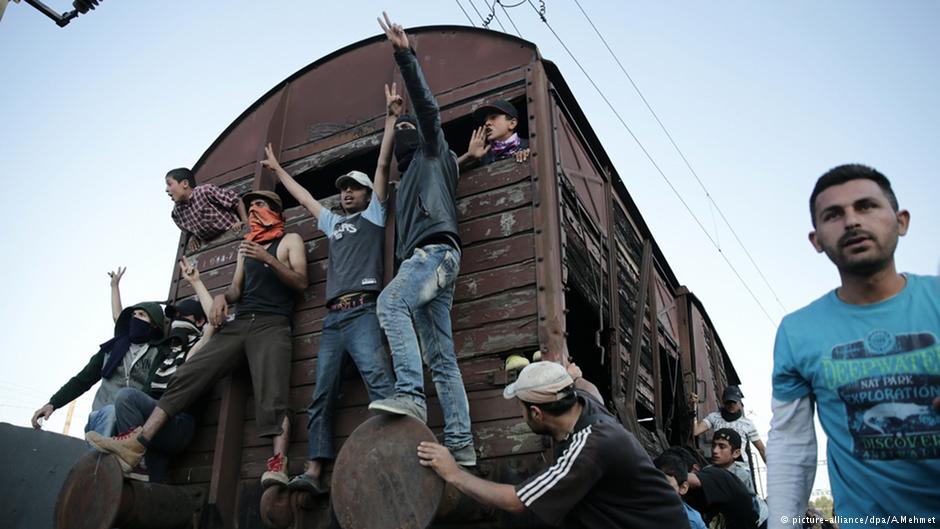Quelle: Moving Europe
Today, refugees in Idomeni organised another sit-in on the traintracks to protest against the continued border closure and the deteriorating conditions in Idomeni. “We didn’t bring our children to die here, open the door, if we wanted to die we could have stayed under the bombs there” (RefugeeTV, translation by Moving Europe).
The protesters also criticised the new policies used to convince people in Idomeni to move to the new camps and discussed whether Greek police is preventing volunteers from bringing food inside the camp. “They want the people to get desperate and to move to the new camps but people are being patient and people are not leaving here until the last breath, even if they let us starve” (RefugeeTV, translation by Moving Europe).
* RefugeeTV is a self-organised report team from Idomeni making regular reports about the situation and protests in Idomeni.
Push-back testimony: European border guards in Macedonia
Given the continued border closure and the lack of legalised routes for onward travel, refugees stuck in Idomeni try to find other ways to cross. However, backed by the desire of European leaders to close the Balkanroute and with the support of European border guards, Macedonia is executing a tight border control regime and systematically returns refugees from Macedonia to Greece. Moving Europe spoke to K. and his family, who were caught in Macedonia by European border guards, taken to one of the camps in Macedonia, and returned to Greece by the Macedonian military:
„I tried to cross from Greece to Macedonia two days ago. I was with my wife and my four children. We were in a group with many young people. When we reached the Macedonian forest, the other people told us that we cannot continue with them, because our children cry and the Macedonian police will hear them and detect everybody. We were alone in the forest. We tried to sleep for a few hours, until about 5am, until it got a bit lighter again. Then we tried to get out of the forest to the main road. When we eventually reached the highway, we tried to find out how to continue. A car came and stopped. Three officers got out of the car, one of them looked like he had a superior grade. They told us to sit on the floor. They were not speaking to each other in Macedonian, and their uniforms were different, not like the Macedonian uniforms. They were wearing dark blue uniforms, with an EU emblem on the side. They were well-equipped, with guns and walkie-talkies. They started to ask us questions: „Where did you come from?“, „How long were you in Turkey?“, „How much money did you have in Turkey and where did you get the money from?“, „What is your nationality?“, „What is your religion?“. We told them that we are Syrian-Kurdish Muslims, and that I earned the money through my work. The officers asked us a lot about Turkey. The officers made a phone call, speaking in English and not in Macedonian. Another car came, it was a car from the Macedonian military. We had to get into the car, we were in the car for around 4 hours, they drove us to a camp in Macedonia. We drove through a big gate into the closed camp, it had surveillance cameras and people were not allowed to leave. There were maybe around 400 or 500 people in the camp. We asked if we can stay in Macedonia. The response was that we cannot, that people in this camp should all go back to Greece. One of the officers, I think he was an Austrian officer, said „Merkel does not want you anywhere in Germany“. We were taken back to the border in a Macedonian military car, and had to walk the rest of the way back to Idomeni.“
Increased controls
Moving Europe also witnessed more frequent police control on the way to Idomeni. The Greek police controls passports and registers car numbers, while asking questions about organisations and reasons for people to go to Idomeni.
:::::
siehe auch: DW
Randale im wilden Lager von Idomeni
Mit Tränengas und Blendgranaten ist die griechische Polizei gegen hunderte randalierende Migranten vorgegangen, die den mazedonischen Grenzzaun durchbrechen wollten. Die griechische Regierung gerät derweil in die Kritik.
Flüchtlinge werfen mit Steinen, die Polizei antwortet mit Tränengas. Vier Randalierer und zwei Polizisten wurden bei den Krawallen verletzt, wie griechische Medien berichten. Viele der Randalierer, aber auch unbeteiligte Migranten und Kinder, litten an Atemwegsbeschwerden wegen der beißenden Luft, die die Tränengaswolken erzeugten.
Eisenbahnwaggon als Rammbock benutzt
Die Ausschreitungen im illegalen Flüchtlingslager der Grenzstadt Idomeni hatten am Mittwochabend begonnen. Erst am frühen Donnerstag beruhigte sich die Lage (Bild oben). Rund 300 Lagerbewohner hatten versucht, den mazedonischen Grenzzaun in der Nähe zu durchbrechen. Dazu wollten sie einen Eisenbahnwaggon als Rammbock einsetzen und den Zaun auf der mazedonischen Seite niederreißen.
Griechische Medien kritisieren derweil die Regierung in Athen. Sie wollte das improvisierte Zeltlager, in dem miserable hygienische Zustände herrschen, eigentlich bis Anfang Mai räumen. Bisher ziehen die Flüchtlinge von dort nur langsam ab. Medien schreiben bereits vom „Ghetto Idomeni„. Nach Informationen des griechischen Stabs für die Flüchtlingskrise halten sich derzeit gut 9.000 Menschen dort auf. Medien berichten dagegen von bis zu 11.000 Menschen, die ausharren, seit Mazedonien vor rund vier Monaten seine Grenzen geschlossen hat.
Eisenbahnverbindung blockiert
Immer wieder gibt es in dem Lager Tumulte. Die Menschen weigern sich, in staatliche Auffanglager umzusiedeln. Sie hoffen, dass die sogenannte Balkanroute doch noch geöffnet wird und sie nach Mitteleuropa gelangen können. Seit mehr als fünf Wochen besetzen Flüchtlinge und andere Migranten zudem die Bahnschienen des für die griechische Exportwirtschaft wichtigen Grenzübergangs. Bei den Blockierern handle es sich vornehmlich um Migranten aus Marokko, Tunesien, Afghanistan und Pakistan, berichtet der griechische Fernsehsender Skai.

